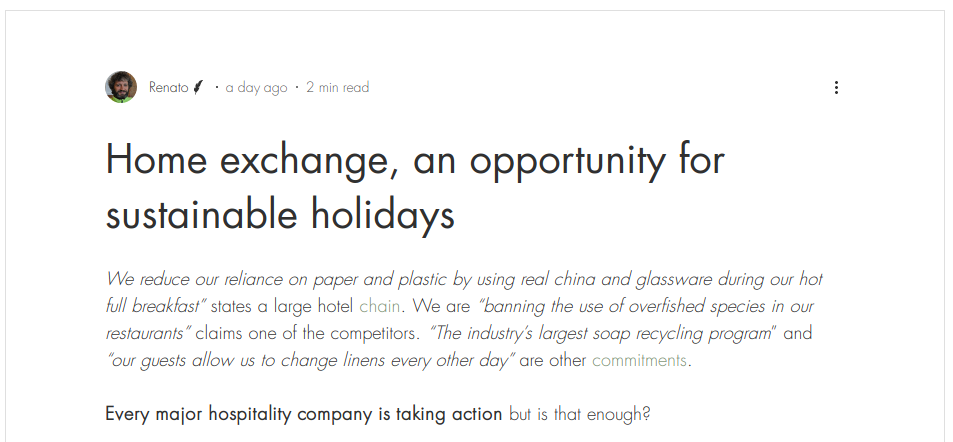From Amsterdam to Marseille, from Rome to Barcelona. In many years of remote working, I have often relied on house swapping to have a home away from home. A few working days in a different city or a relaxing holiday. Earlier this year I wrote for Caryzma about one more reason I like it, sustainability. The piece is below as well.

We reduce our reliance on paper and plastic by using real china and glassware during our hot full breakfast” states a large hotel chain. We are “banning the use of overfished species in our restaurants” claims one of the competitors. “The industry’s largest soap recycling program” and “our guests allow us to change linens every other day” are other commitments.
Every major hospitality company is taking action but is that enough?
What about renting a flat? For years, Airbnb has been promoting the environmental benefits of home sharing, claiming “reduced water usage equal to 13,000 Olympic-sized swimming pools” by their European guests. That was before they had to defend themselves for the affordability of housing and contributing to gentrification in a lot of big cities.
Is there a simpler way to enjoy a holiday in a more sustainable way?
There are alternatives to hotels and online marketplaces and some of them aren’t even that new. Home exchange , also known as house swapping has been around for almost 70 years. Glamorized by Cameron Diaz in The Holiday, you offer each other’s homestays without monetary compensation. And it is more sustainable than hotels and lodges by 67%. OK, I made this number up.
Reduce, Reuse, Recycle
If Airbnb listings “generate less waste, use less water, and drain less energy than traditional hotel accommodations”, staying in another family’s home has the all benefits of home-sharing without the drawbacks. With home exchanges you maximize the use of existing resources, staying at flats and houses that already exist without Airbnb’s negative side effects.
“Just below half of Airbnb hosts in North America and Europe provide single-use toiletry products for their guests”. I can not recall any single-use shampoo in twenty home-exchanges across Europe I have stayed in. But I had nothing but positive experiences from Amsterdam to Rome, from Marseille to Barcelona. You can work and take holidays in different cities, living almost like a local.
Where to start and how?
While joining one of the many networking services helps, you can also ask your Facebook or LinkedIn contacts. You might just find an alternative holiday. And if you’re considering a stay in a Bauhaus in Berlin, get in touch.
Resources
A few starting points to learn whether home exchange is for you:
10 things you need to know about home swapping
Home Exchange A How-To Guide for Travelers
The guide to everything HomeExchange
How to home exchange